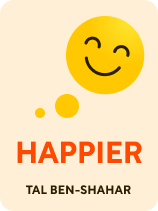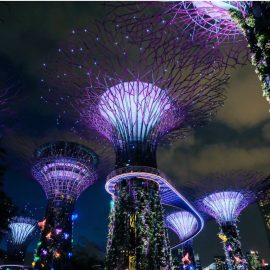

This article is an excerpt from the Shortform book guide to "Happier" by Tal Ben-Shahar. Shortform has the world's best summaries and analyses of books you should be reading.
Like this article? Sign up for a free trial here.
What is true happiness? How do you find pleasure and meaning in your life?
Many of us make the mistake of thinking that happiness is life’s end goal. According to Tal Ben-Shahar, happiness isn’t a final destination, but rather an ongoing journey to find a balance of pleasure and meaning.
Continue reading to learn why it’s hard to achieve Ben-Shahar’s version of happiness.
What Is Happiness?
According to Tal Ben-Shahar, happiness isn’t a static state or finite destination but an ongoing process of exploring how to find both pleasure and meaning in our daily lives. He explains that pleasure is about immediate gratification—enjoying the present moment and seeking experiences that bring joy, comfort, or sensory delight. Meaning, on the other hand, requires a longer view. It’s the sense of purpose or understanding that what you’re doing contributes to a greater cause or aligns with your values.
(Shortform note: Philosophers have long debated the meaning of happiness and the best way to achieve it—in fact, Ben-Shahar’s definition closely aligns with Greek philosopher Aristotle’s concept of eudaimonia, often translated as “happiness” or “flourishing.” In Nicomachean Ethics, Aristotle defines eudaimonia as a state of well-being derived from both immediate pleasure and higher purpose. Like Ben-Shahar, Aristotle concluded that happiness is an ongoing search for pleasure and meaning.)
Happiness requires finding a balance between pleasure and meaning, says Ben-Shahar. A life focused solely on pleasure without meaning can feel shallow and unfulfilling in the long run, while a meaningful life devoid of pleasure can become burdensome and result in burnout and resentment.
(Shortform note: Ben-Shahar explains that happiness requires finding a balance of pleasure and meaning, yet striking this balance can be challenging, especially for women. According to a BBC report, female professionals are more susceptible to burnout than their male counterparts. Women are often expected to handle multiple, sometimes conflicting, responsibilities in their roles as professionals and caregivers who also often carry the majority of the domestic labor. These layered expectations lead to overcommitment and exhaustion that make it harder for women to find time for activities that bring them pleasure or meaning.)
The Four Archetypes
Finding a balance of pleasure and meaning requires us to weigh the present and future benefits of our choices. Ben-Shahar introduces four “Happiness Archetypes” to explain how living too much in the present, focused on pleasure, or too much in the future, focused on meaning, can negatively impact your quality of life.
Archetype #1: The Pleasure-Seeker
The pleasure-seeker is someone who focuses on the pursuit of immediate pleasure and sensory enjoyment without regard for deeper meaning or long-term satisfaction. A pleasure-seeker is focused on the present and gives little thought to the future.
Ben-Shahar argues that a life primarily focused on fleeting joy often fails to provide lasting happiness. This short-lived delight leaves individuals constantly craving more. Without any meaningful or purposeful activity, they lack long-term fulfillment. Furthermore, an excessive focus on pleasure can also lead to superficiality or self-indulgence, which makes it harder to forge deep connections with others.
(Shortform note: Modern life, which relies heavily on the internet, seems to encourage this kind of pleasure-seeking behavior. In The Shallows, Nicholas Carr argues the internet fosters a culture of instant gratification that parallels the pleasure-seeking behavior described by Ben-Shahar. For instance, the transient pleasure we get from endlessly scrolling through social media feeds or rapidly clicking through hyperlinks are examples of the immediate sensory enjoyment typical of a pleasure-seeker. He argues that online activities often focus on present interaction without much regard for understanding underlying narratives or contemplating long-term consequences. But like Ben-Shahar, Carr explains this kind of surface-level interaction eventually leaves individuals unsatisfied.)
Archetype #2: The Overachiever
The opposite of the pleasure-seeker is the overachiever. According to Ben-Shahar, the overachiever is someone obsessed with advancing in their career, wealth, or status, often at the expense of their personal well-being or happiness. They’re focused only on the future and see the present simply as a stepping stone to higher goals.
Ben-Shahar cautions that this kind of life, like that of the pleasure-seeker, also breeds discontent and dissatisfaction, but for different reasons. The overachiever functions under the illusion that reaching a certain goal will bring them happiness, ignoring the fact that there will always be another goal to reach—usually more prestige, more money, or more stuff. Furthermore, the focus on personal goals at the expense of all else can erode personal relationships and the ability to enjoy simple daily pleasures.
(Shortform note: Some argue that the present-day culture of overachievement can be traced back to the Protestant Reformation. In The Protestant Ethic and the Spirit of Capitalism, Max Weber argues that Protestantism sowed the seeds of the capitalistic attitude toward work prevalent today. This Protestant ethic promoted the idea of a “calling”—the belief that diligent work in a vocation is a form of moral virtue, a means of glorifying God. This attitude toward work, Weber suggests, has seamlessly transferred into the secular sphere of capitalism. Capitalist societies have absorbed this valuation of relentless hard work, equating it with morality and individual worth.)
Archetype #3: The Cynic
The cynic is someone who lives a life without pleasure or meaning. They believe life is pointless. Rather than pursuing pleasure or meaning, the cynic rejects conventional beliefs about morality, value, or purpose, believing that the present and the future are inconsequential.
Ben-Shahar cautions that this mentality can create an endless cycle of dissatisfaction and despondency. The cynic’s life is marked not by attempts to create meaning or find enjoyment, but by skepticism and distrust toward anything that might offer them. Even when faced with potential joy or achievement, the cynic may dismiss it as insignificant or transient, thus reinforcing their negative worldview. Furthermore, the cynic’s constant skepticism and negativity can estrange them from others, leading to isolation and loss of interpersonal connections, which are key components of happiness.
(Shortform note: In The Myth of Sisyphus, Albert Camus acknowledges that life can seem painfully meaningless and absurd in the face of our inevitable death. However, using the metaphor of Sisyphus, a figure from Greek mythology sentenced to eternally push a giant rock uphill only to watch it roll back down, Camus argues that even in the roller-coaster of effort and disappointment, we can find purpose in the act of living itself. He argues that in the face of life’s inherent absurdity, we must find meaning by creating our own purpose.)
Archetype #4: The Happy Camper
Finally, we come to the happy camper—someone who has mastered the art of balanced living. According to Ben-Shahar, a happy camper knows how to savor the pleasures of the present moment while simultaneously setting and working towards meaningful future goals. Such a person considers past experiences as valuable lessons, indulges in present-day joys, and holds clear aspirations for the future.
Ben-Shahar argues a happy camper is most likely to live a satisfying life filled with joy. By relishing in the present and remaining motivated toward the future, the happy camper effortlessly enjoys life’s journey. They firmly believe that delightful present experiences and ambitious future dreams aren’t mutually exclusive.
Ben-Shahar explains that we all have a little of each of these archetypes in us, but that we may tend to gravitate toward one more than another. He suggests that in your pursuit of happiness, you should try to embody the happy camper, someone who enjoys the present moment while simultaneously working toward future goals.

———End of Preview———
Like what you just read? Read the rest of the world's best book summary and analysis of Tal Ben-Shahar's "Happier" at Shortform.
Here's what you'll find in our full Happier summary:
- Why happiness should not be your end goal
- An explanation of the four "Happiness Archetypes"
- Practical strategies to cultivate happiness in your everyday life






